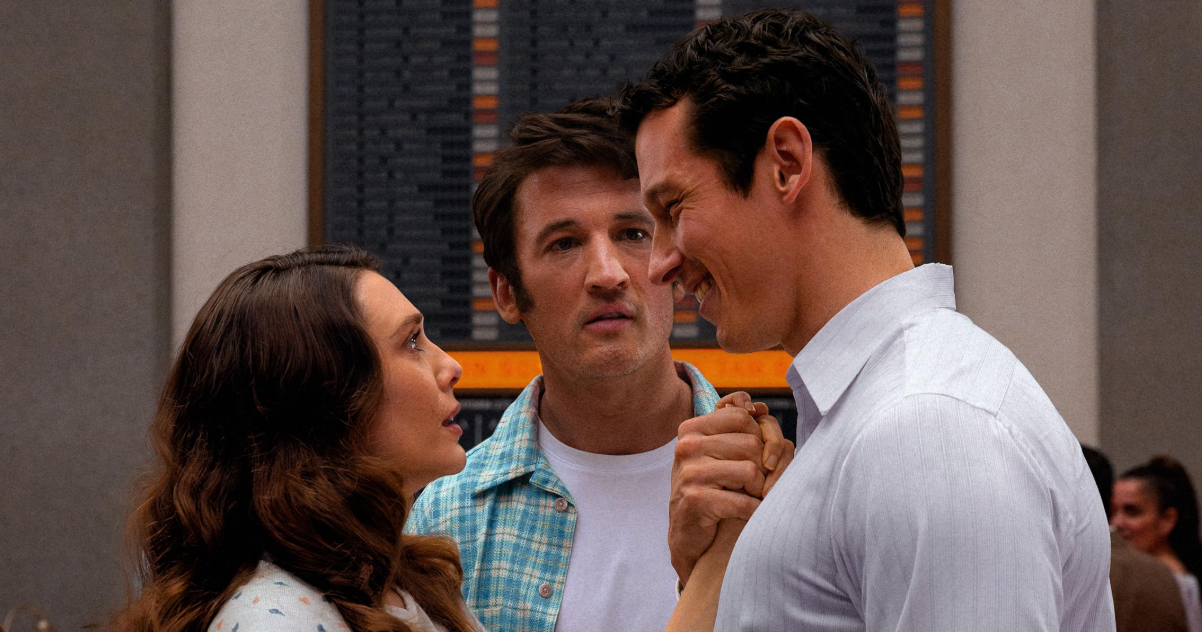“’Til death do us part” is a familiar vow of loyalty between married couples, but what happens after death? In Eternity (2025), Elizabeth Olsen plays Joan, a widowed woman who faces this impossible question.
As the movie opens, we are introduced to an elderly Joan and her husband Larry (Miles Teller) on their way to visit family. Having been married for 65 years, the two are, quite literally, an old married couple. Their relationship is equal parts irritable and comfortable, and their constant bickering over bad habits and life problems is the kind that only comes about from a lifetime spent together.
The party is cut short, however, when Larry unexpectedly chokes on a pretzel and dies. He wakes up in The Terminal, the limbo space where the dead wait, deciding where to spend the rest of eternity. The space is a comically bureaucratic take on the concept of the afterlife, modeled after familiar settings where time seems to cease, such as airports, casinos, and department stores. With an uncanny feel, this setting is deeply reminiscent of TV shows and movies like The Good Place (2016), Loki (2021), and The Truman Show (1998).
The surrealism of the corporate purgatory is heightened by director David Freyne’s noteworthy use of color. In an age where nearly every movie has the same desaturated, straight-to-streaming look, Eternity is a breath of fresh air, with each shot teeming with rich crimsons, emeralds, and royal blues. Freyne’s striking use of color adds to The Terminal’s unnatural brightness, helping to sell the setting’s artificial nature and striking the perfect balance between fantastical and mundane.
The Terminal is run by afterlife coordinators, one of whom is Anna (Da’Vine Joy Randolph), who is assigned to Larry. She walks him through the seemingly endless array of eternities available—including the classic Christian heaven, a man-free eternity (that’s currently at capacity), and even Capitalist World, among other, more absurd options—with the catch being that, once you select an eternity, you’re not allowed to change your decision.
This becomes an issue when Joan passes away and reunites not only with Larry in The Terminal but with Luke (Callum Turner), her first husband, who died in war during her youth, as well. Luke—suave, cool, and collected—has been waiting for Joan’s arrival for 67 years, and his unexpected presence brings about a nightmare of a predicament for her. What follows is a long series of fights as both men try to prove their worth to their shared spouse.
The flames are fanned by Anna and afterlife coordinator Ryan (John Early), who don’t hesitate to pick sides in the love triangle. The two are wholeheartedly Team Luke, citing reasons that voice the immediate thoughts of viewers. Luke’s agreeable where Larry is cranky, he’s novel where Larry is familiar, and, despite how some audience members may argue, the film really wants you to believe that Callum Turner is leagues hotter than Miles Teller. The levity that Anna and Ryan bring as a duo is one of the film’s highlights. Randolph, in particular, is stellar, and, if nothing else, viewers will walk away from Eternity remembering her delightful performance and looking forward to her next project.
However, in the crossfire of the comedic arguments, snappy quips, and petty fights for valor sits Joan, who, somewhat ironically, is in hell. As the conflict progresses, the focus of the film moves from Larry to Joan, and the tone shifts with it. Joan is left with the weighty choice between the life she never got to experience and the life she actually lived, and she must decide which type of love is more meaningful. This is the heart of the film, and it’s also what sets it apart in its genre.
The cultural zeitgeist has been dominated by love triangles lately, with Eternity being the latest to join hits like The Summer I Turned Pretty (2022), Challengers (2024), and Materialists (2025). Although the initial trailer release in July certainly drew up some buzz about which man was the better pick—based solely on looks, fandom, and limited plot information—Eternity takes a notable step away from typical will-they-won’t-they love triangle tropes. Underneath the high-concept premise, witty jokes, and big-shot cast, there’s a clear message about love and commitment. Joan’s decision is not one that’s influenced by the flashy, Vegas-style paradises in each eternity but by the husband with whom she will spend the rest of eternity.
The end of the film, where she finally makes her choice, is notably more subdued than the beginning. In some ways, this choice didn’t quite work. The multiple fake-out conclusions and plot twists caused the pacing of the third act to feel both rushed and like an eternity (*ba-dum-tss*). However, it also served as a well-placed contrast to the excitement of The Terminal, contributing to the film’s message that love exists in the ordinary.
Eternity is, of course, a rom-com, and it successfully brings enough charm and nail-biting anticipation to put it close to some of the most popular in the genre. But it’s also a meditation on marriage and commitment. As the story comes to its end, Freyne leaves viewers with a charming conclusion and a fuller idea of what it truly means to be with someone for better and worse, in sickness and in health, to love and cherish as long as you both shall live.






